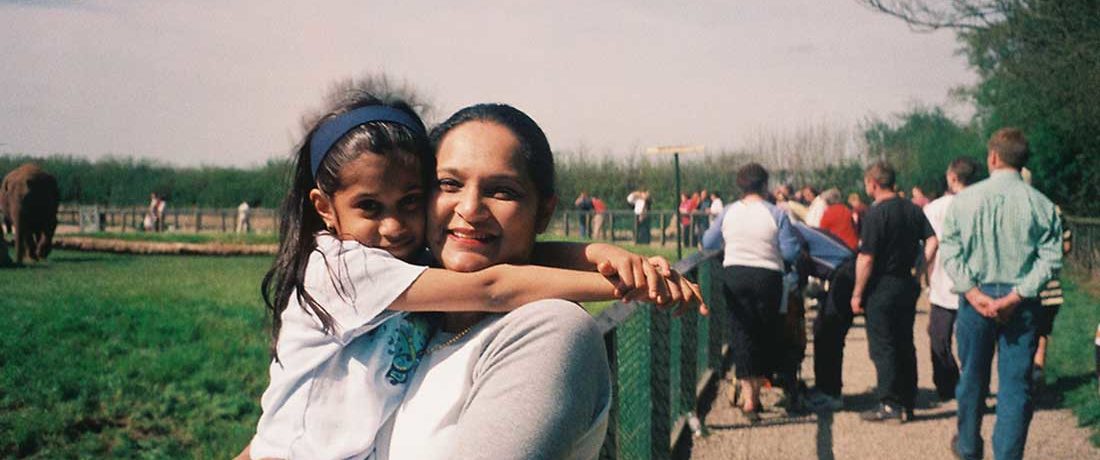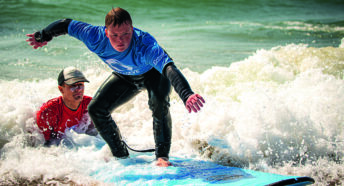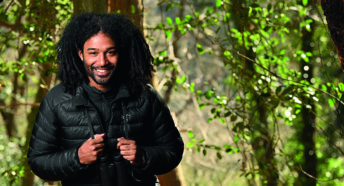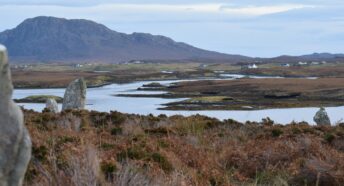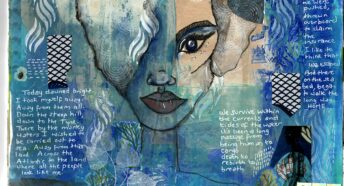Countryside dreams in Leicester’s South Asian communities
Serayna Solanki captured over 14 hours of dialogue with seven people within her home city of Leicester to explore relationships with the countryside, contributing to the making of a collective multi-generational and multi-ethnic story of South Asians in Leicester.
In February 2020, right before lockdown, I caught the Thameslink down to Brighton from Finsbury Park. I hopped on the 12X for 45 minutes to Seven Sisters Country Park Stop, to wander down to the shores of Cuckmere Haven and over the hills to Birling Gap. Seven Sisters Road to Seven Sisters Cliffs.
The ocean was calling and so was the fresh air on the top of the cliffs. I remember the squeamish feeling of walking on large pebbles, when the cold shore rushes through and over my toes. I desired to splash sea water on my face and feel the gentle salty sting. It always takes a while to settle into nature’s forces, to accept that the wind now has control over my hair.
When I sat near the cliff edge to look out at sea, I muse on all the possible lost non-English words to describe the sun that reflects a pathway over the sea. After a while, I’m consumed with delight and gratitude for being able to be here, amongst the satin glazed wetlands, chalk-tinted waves that crash into the cliffs and in shared space with ravens (and other dwelling non-human creatures). The puddles I would usually walk around are intentionally stomped through.
I was out and just being.
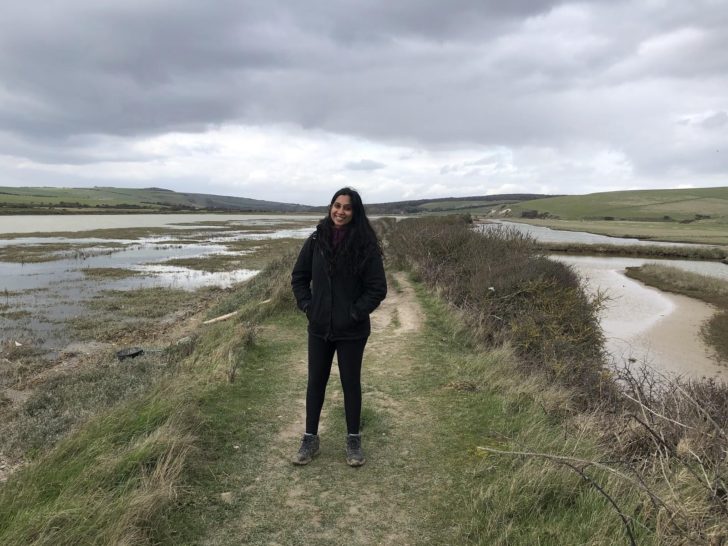
‘Will there be people like me?’
To access the countryside is a range of experiences. From going on a walk on a nearby trail, through nature conservation sites. Visiting a national park within the regional area. Going to the fields that neighbour cities, perhaps to forage and follow streams. Day trips to scenic Areas of Outstanding Natural Beauty. Hikes with overnight B&B stays. Organising longer trips, where you get to enjoy the landscape, place to place. Camping in the wild, hopefully with the spontaneity of wild swimming. Having an environmental job based in the countryside; perhaps as an ecologist, ranger or scientist. Being an artist, poet or writer who attends countryside art residencies to be absorbent to the wild landscape. Moving to and living in a rural village. Being a sports hobbyist, like a mountain cyclist or canoeist. Owning land, working on the land.
I imagine there are many in between and more that I have missed, because my imagination cannot imagine the endless experiences of the countryside.
My experiences are limited – I once hiked East Devon with overnight B&B stays. As I work through the possibilities listed above, questions creep up. Is the opportunity even attainable? Or is the equipment and activity affordable? Wherever I go, will it even be welcoming? Will there be people like me? Why are these ranges of experiences not afforded to everyone? Will it be accessible if I wanted to go with my community?
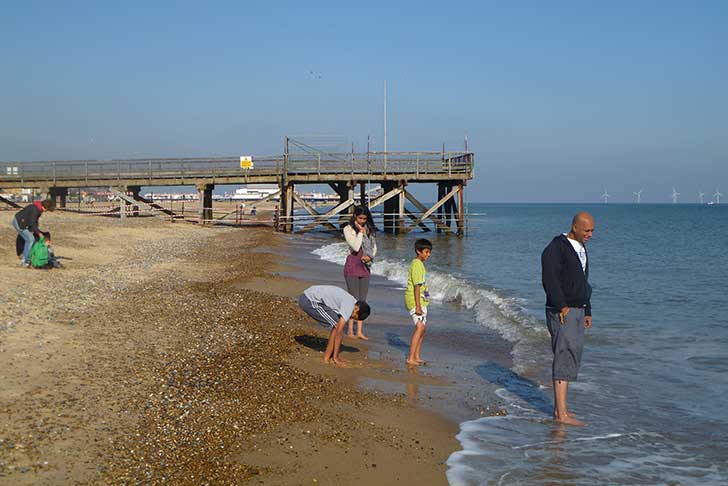
Unveiling realities
Commissioned by CPRE, the countryside charity, I listened, learnt and connected to the stories of seven people within the diverse South Asian community of my hometown, Leicester.
Like everyone, we all have our own journey and story. I wanted to know about their experiences of the countryside, the source of their relationship to nature, and the barriers to that source and the countryside as a place.
Each individual story was powerful, detailed with unique moments, memories and desires. The sharings were rich in deep meanings of nature, sourced from cultural traditions that have survived through time, across seas and generations.
Everyone’s story had many joyful memories of being in nature in many places; in countries that were once home, and urban green areas like parks, gardens and allotments. What was noticeable was the shallow presence of countryside experiences, highlighting the little access or experiences that had been had. The details of how class and racial barriers play a role were very visible. All people came from historically rural residing communities ranging from Kashmir, Pakistan, Punjab and (South) Gujarat.
Making space
I captured over 14 hours of dialogue. Every person contributed to the making of a collective multi-generational and multi-ethnic story of South Asians in Leicester. These stories are not representative of all South Asians in Leicester, nor all South Asians around the UK, nor all ethnic minority communities. However, people may relate to the experiences of structural barriers that dominate access or experiences of nature itself.
When we don’t have space to acknowledge, make deeper sense of and connect our stories, it can disempower and disable our ability to bring about real change. When these spaces of reflection are created, though, perceptions mature, ideas and approaches are exchanged, many realities are made visible. That is what these conversations did.
For me, it’s important that communities are funded and supported to curate programmes that centre their realities and improve access to nature. When programmes are created by and for communities, they use the skills that are natural to being part of a complex collective narrative, whilst acknowledging the deep human experiences we have within and around society’s structures.
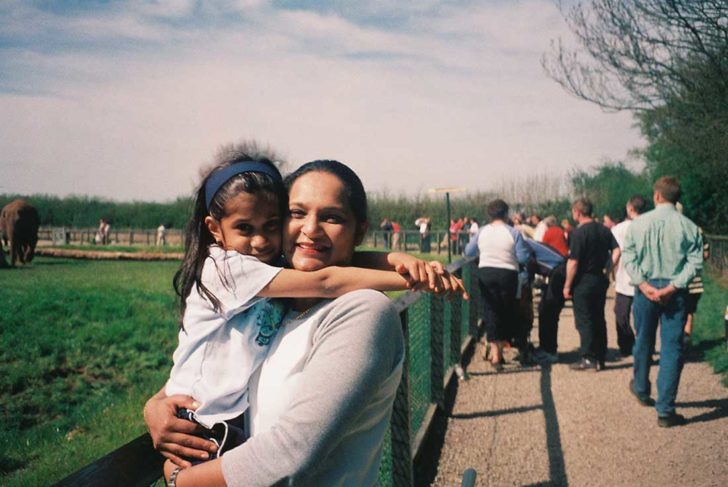
Some things are clear from these stories: I have repeatedly heard experiences of financial deprivation, racial hostility, and outdoors organisations’ culture of one-size, one-path standards and single-culture world perceptions.
It’s the responsibility of the outdoors and environment sector to challenge these barriers. Directing resources and support to community-led projects, both emerging now and as-yet dormant in our imaginations, can be a step forward.
Snippets of life
A note for readers: these are some very, very small extracts from what was shared. Be mindful that these are tiny snippets of people’s life stories, that in turn are part of a bigger collective narrative that you, the reader, may not have visibility and comprehension of.
‘When my grandma grows stuff, like tomatoes, they grow so differently – she grew a tomato plant that was tiny but had hundreds of tomatoes on. It was beautiful to see. She finds peace and solace in nature and works with the soil. When I visit her today, you can tell she has been working on it for years because of how fertile, soft and porous the soil is.’
‘There is a desire and passion to see more. My grandma likes going to parks, I don’t know how far she has been… I imagine, being middle class, you have the opportunity to see more places.’
‘I have access to a garden. Speaking to people who live more towards the inner city about gardens, they just have a yard. I have access to fields in 5 minutes. Leicester is a small city, not that far from the countryside and if you have access to a car, you can go wandering in the country.’
‘Being in nature is great for health and wellbeing, to take you away from everyday stress, free your brain and have fresh air. By strolling through nature, I am closer to nature, I have a relationship. I can appreciate it more, the fresh air and I need slow time to be able to be with nature because it is a slow and gentle part of life.
‘Some plants and trees, I know the names in Gujarati’.
‘I think, if I am going to the countryside, I would like to be able to have meaningful discussions with other people from different cultures to see what we share and love what’s different. I would love to be able to have information about the trees, birds and animals, so I have better awareness.’
‘I’m just trying to survive, I have three jobs and I don’t have time to invest in other things. I went through a phase of loving nature photography, and I found it hard to get a job because of all the equipment I needed and I thought it was very white-dominated.
‘If I had the opportunity to, I would love to take up a job working in nature and perhaps with children again.’
‘As a taxi driver too, I am always driving everywhere – in the city and to other cities, so I learn a lot about where things are and where the great nature spots are just by being able to drive around and speak to people. But even then, I’m in my car, I don’t know where to stop to explore it.’
‘I would love to create spaces that are more meaningful for us, like fruit tree gardens where you can sit under trees at leisure and no rush, it has to be no rush. It’s more special in giving people memories that remind us of places.’
‘British culture has helped me at the same time, to show me what was different to see from their side and to appreciate it for what it was from their perspective. To me, it’s just grass, trees and views. But I think that’s because I’ve grown up knowing how diverse nature is, and seeing the rich biodiversity.
‘In Uganda and India, we use nature more – through fruit trees and food. It’s not just in one spot but everywhere, amlee trees and mango trees. I think the connection with nature is very different, as we make our connection through touch. In Britain, it’s that you go to see the view.’
‘Our community is losing its cultural knowledge and has more of an ‘English’ type of mind. In our community, it feels like no one wants to learn, I don’t know if that’s because we don’t value our cultural environmental knowledge, or if it’s because children don’t know it’s available or as important.
‘I think this knowledge is being lost, because they don’t have time to keep learning about it or share it. People want to make money really quickly because we can’t survive otherwise.’
‘In Uganda, my mother had a garden full of things to grow. I remember this huge chilli plant with so many white flowers. She told me to not pick the flowers one day, after she caught me collecting them. Then, hundreds of chillies appeared.
‘When she came to the UK, she cried so much because of what they left behind. When we came here, all 7 siblings and parents were living in one room, we were given times to use the bathroom because it was outside and shared. We then moved into another property that had a little garden. So we would grow methi, dhana and spinach.’
‘Our community has experienced racism in the countryside. One time we wanted to use the bathrooms and have a cup of tea, it felt like everyone was staring at us for wearing Indian clothing. We decided to leave, we didn’t like it.’
‘Last year, I was in a random work meeting, when I worked in corporate. A (white) senior manager asked me ‘Why do all the BAME people come to Rutland Water now? They keep parking on my drive.’ I was gobsmacked, I didn’t know what to say in a corporate setting where it might have jeopardised my career.’
‘When we came here, we knew we had to get jobs to survive, that’s what our focus was. We had a yard in our garden, which was covered in rocks and we transformed it into a garden to grow methi and dhana.’
‘When I was younger in the 80s, me and my friends would take trips to Bradgate Park and Rutland Water. We would take our marinated meat and booze for BBQs. We only heard about it through word of mouth that there was this open area, nothing official.’
‘I think that in our religion and traditions, there is a deeper meaning of the earth, river and we use plants in our rituals for what they symbolise. The banana leaves are used for certain things, even though we don’t have these items around us, we have found a way to adapt.
‘We do believe that we are at one with nature but I see over generations that value is being lost. I think it’s because of parents not passing down the knowledge, but that’s because the way we need to survive is different now – we’re pressured to survive in a way that doesn’t consider these things are important.’
‘I did the Duke of Edinburgh award when I was younger but I didn’t have the same appreciation of nature – that seemed more like a challenge rather than an adventure. I also did it because of employability, not thinking I was doing it because it was actually something to equip me with the skills to explore the outdoors again.
‘My love for nature has come from knowing its loss and environmental campaigning and realising that I didn’t have a connection to it, which was so beautiful to rediscover. Reuniting with cultural knowledge has bought deeper meaning. Because I knew how to read a map, plan a route and know what equipment I needed, I felt confident to do this on my own, even 7 years later.’
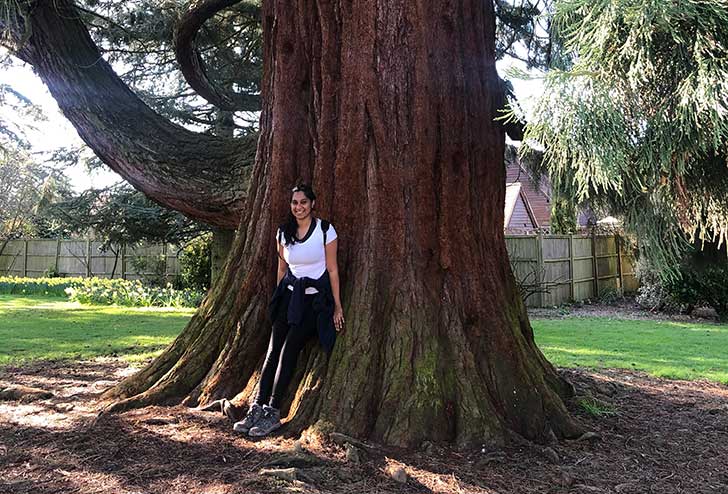
Dreaming on
When inviting people to imagine what projects they would like to see, they were all inspired by their histories and memories.
Their dreams were imagined from a place without access or resources – yet. I’m excited to witness how big these dreams can become when access, opportunities and agency are available and resources are distributed to bring dreams into reality. All of the people I have interviewed (and more) would openly welcome the co-creation of outdoor programmes and acquire skills where we get to be in the countryside.
This can be done in a way that’s mindful of the elderly, and of disabled and health needs; can respect cultural knowledge and languages; restores the possibility of lost dreams of working outdoors; imagines job alternatives for younger generations based on newly-found hobbies; contribute to the design of landscape; be enriched by nature to enrich our lives and wellbeing; bring better intra and cross-community cohesion; gives access to equipment for outdoor hobbies.
But for as long as funding, finance, time, support and skills are inaccessible and unavailable? Then access is unattainable and these experiences remain just that – dreams.
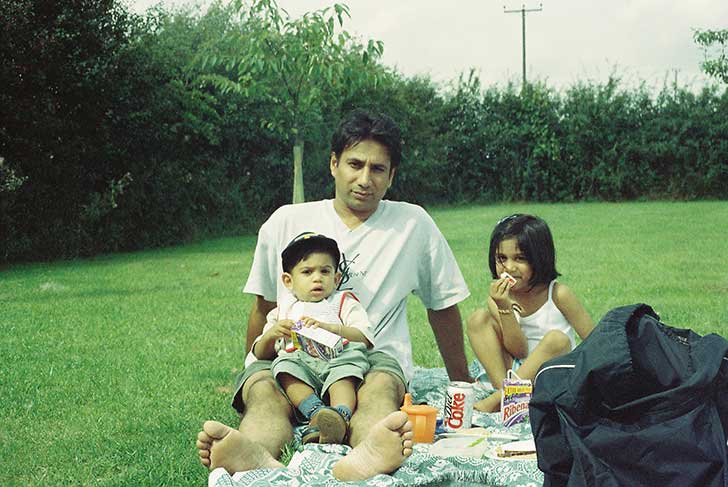
Serayna was one of the researchers in a 2020-21 CPRE access to the countryside research project. These stories form part of this participative research project on a countryside for all.
